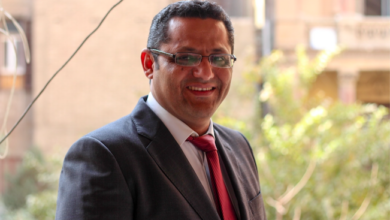Like many other independent labor and professional unions, as journalists try to organize their own associations, they are being met with bureaucratic obstacles as well as a legal confrontation from their official syndicate.
Independent associations have criticized the official Journalists Syndicate and its guidelines for membership for being excessively restrictive. Of the tens of thousands of professional journalists in Egypt only some 6,000 are members of the syndicate.
A day after the Independent Journalists Syndicate announced its (informal) establishment on 22 April, the official syndicate's lawyer filed a legal complaint with the public prosecutor in an attempt to ban the alternate organization.
Wael Tawfiq is a founding member of the independent syndicate and an activist with the group known as Journalists Without a Syndicate.
"The Journalists Syndicate is confronting us with legal action. Nonetheless, we will drive ahead with our efforts to organize Egypt's journalists into an independent syndicate,” Tawfiq said. "A syndicate which actually represents us and protects our rights."
He said the official syndicate's legal action is "an attempt to monopolize the representation and organization of journalists."
Sayyed Abu Zeid, lawyer for the official Journalists Syndicate, said, "We filed our legal complaint to the public prosecutor on the basis that the so-called Independent Journalists Syndicate was established in contravention to Law 10 of 1941."
Abu Zeid clarified: "Any professional syndicate must be established by an act of Parliament. A syndicate cannot be established from behind any podium, for there are laws which govern such professional associations."
Although they may be informally organized, Tawfiq claims that the Independent Journalists Syndicate has between 300 and 400 members, of whom about 80 percent previously did not belong to a union. The other 20 percent are former members of the official syndicate.
"Since we declared our establishment we have been accepting new members, almost on a daily basis," he said.
The Nabil el-Helaly Center for Human Rights, where the independent syndicate’s formation was announced, is serving as its ad hoc headquarters. The group is looking for more permanent headquarters and regional offices.
According to Tawfiq, the syndicate plans to hold a founding general assembly to elect officers and draw up bylaws within the next two weeks.
Tawfiq added that they will also discuss whether to join forces with the recently established Egyptian Online Journalists Syndicate, which, like the Independent Journalists Syndicate, was contrived due to the official syndicate’s membership restrictions on online journalists. The EOJS reportedly has some 200 members and is headquartered in the Multaqa Towers in Abbasseya.
Both the Independent Journalists Syndicate and the EOJS have committees to approve new members on the basis of a documented archive of published, screened or aired work indicating steady employment for at least one year.
Abu Zeid, the Journalists Syndicate attorney, said the legal complaint was directed against the Independent Journalists Syndicate, not the EOJS.
"We hope to amend our regulations to facilitate the admission of more online journalists; and we hope to absorb the online syndicate within our ranks," Abu Zeid said. “The efforts of the so-called Independent Syndicate will only serve to divide the ranks of Egypt's journalists.”
However, the official Journalists Syndicate has been shaken to its foundations with the sacking of (former, pro-Mubarak) President Makram Mohamed Ahmed and his council in February. Afflicted with schisms and in-fighting, the official syndicate is currently being managed by a caretaker council. Elections – reportedly, along with membership reforms – are scheduled for November.
Over the past decades, thousands of professional journalists have struggled to gain membership, and often been denied, in the Journalists Syndicate. The requirement of a full-time contract for at least a year and restrictions on non-print media – along with a host of other prerequisites – have kept the majority of Egyptian journalists from joining. The membership committee also convenes infrequently to accept new members on a seasonal basis.
In October 2008, some 40 applicant journalists protested when the committee denied them membership. Ten journalists conducted a hunger strike at the syndicate's headquarters, with a number of them ultimately being hospitalized.
Socialist journalist Omar Saeed, one of the hunger strikers, was eventually admitted into the syndicate's rosters.
"The membership committee asked me totally irrelevant questions, like 'What are your political tendencies?' and 'Do you belong to a workers' platform or organization?' They asked me few professional questions relating to journalism," he said.
"In the eyes of the authorities you are only officially recognized as being a journalist if you are a member of the syndicate." He believes that the official Journalists Syndicate offers more in terms of services, than in protecting the rights of its constituents – or journalistic freedoms.
"I support syndicate pluralism. This talk about dividing the ranks of the syndicate movement is utter nonsense," Saeed said. "Plurality and competition among syndicates bring about the best representation, the best protection of rights, and the best provision of services. A person should have the right to pick and chose which syndicate serves them best."
The official syndicate, not surprisingly, disagrees.
"I support plurality for political parties, but not for syndicates,” Abu Zeid said. “Journalists have common interests; we should unite to protect our interests. Strength is in unity, all we need is to clean-up our house, and get it in order."
In terms of international law, Egypt is a state party to the International Labor Organization's Conventions 87 and 98 “Concerning the Freedom of Association and Protection of the Right to Organize” and “The Right to Organize and Collective Bargaining.” Although Egypt ratified these conventions over five decades ago, it has failed to enforce them.
Labor organizations have traditionally been tightly controlled by the state and Egypt's first independent union (since 1957) did not emerge until late 2008.
In mid-March, interim Minister of Manpower Ahmad al-Borai vowed to allow for union/syndicate plurality. With the revolution, about 30 fledgling independent unions and syndicates have attracted an estimated 300,000 members across the country.




